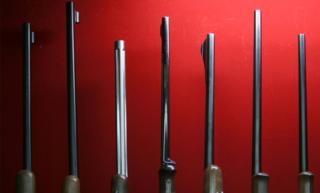 There are few things on this planet which never disappoint. The World Darts Championship is one of them. Every year on the year, it bestows an unstoppable fortnight of dramatic brilliance, amplified by a bloody lot of bloody fun. There is nothing like it.
There are few things on this planet which never disappoint. The World Darts Championship is one of them. Every year on the year, it bestows an unstoppable fortnight of dramatic brilliance, amplified by a bloody lot of bloody fun. There is nothing like it.
The game itself is simple, repetitive, comforting and compelling; sending a dart from hand to board is a rhythmic, hypnotic, idiosyncratic treat – the bass beat on contact complemented by the intellectual thrill of calculating scores and predicting outshots (the finishing sequences). Because it is immediately obvious what is going on, it is immediately absorbing, and because so many of us know how easy it is to play but how impossible it is to play well, we have a handy frame of reference to swiftly make it about ourselves.
Nor does it stop there. Darts is about far more than chucking a pointy thing at a flat thing; it tells a story of humanity that is animated and crystallised in close-up and high-definition. No other sport shows, simultaneously, action and reaction; on stage and on camera, there is nowhere to hide.
Brooking neither luck nor tactics, darts facilitates neither refereeing errors nor stalemates; excuses do not exist. Players can do nothing to affect one another. If things are going badly, no teammate will be along to save them, and there is no option to roll into the reds, deadbat a few or cover up on the ropes. Their only option is to throw better.
As such, there is no more exacting test of pressure, no examination of vertebrae more thorough. Under lights, on camera and in front of a crowd, perform a fine motor skill predicated on a steady hand and an empty mind – good luck with that.
“But is it a sport?” ask the kind of funsters who, in other scenarios, prattle on about the differences between indica, sativa, serotonin and empathogens. The correct answer, of course, is: “Who gives a shit?”
One of the most beautiful things about sport is that it allows us to share the most exhilarating, demoralising moments of people’s lives, entwining them with our own and supplying an intensity otherwise lacking – and darts takes that to another level. We see every expression of tension, fear, devastation and ecstasy – you might call it love – so feel that we know the players, and accordingly, can imagine that they know us too.
Because of that, darts offers a study in humanity to captivate not just those who like darts but those who like anything – its themes the same as those found in literature, theatre, cinema and art. Or, put another way, enjoying it is not a matter of taste; rather, there are those who do and those yet to discover that they do.
And, at the moment, darts is the best sport in the world. This is partly because others are regenerating; there are very few great teams and great individuals currently at their peaks. Darts, on the other hand, has never been played better. Michael van Gerwen won 25 tournaments last year, and 18 tournaments in 2015. He also set a new record for the highest three-dart average ever recorded on television, 123.40 .
Van Gerwen is not just the best dart player in the world but the best anything in the world; one of the best anythings in the history of everything. And he is only 27.
But, as with any great sportsperson, to assess van Gerwen by his numbers is to miss the point entirely. A wondrous bolus of uncut genius, his competitive charisma is startling – a mix of passion, intimidation, egomania, and the most distinctive phizog of all-time. He throws darts like flaming javelins, celebrates like a psychopath, and because it is impossible not to know how good he is, he makes no attempt not to know how good he is. He is perfect.
But he has won only one World Championship, in 2014 – the two since then taken by Gary Anderson, his good friend and polar opposite. A laidback, likeable Scot, Anderson is prone to miscounting and, until very recently, to mis-seeing. Only recently did he start wearing the glasses that he’s needed for years. Early in his career, Anderson was the man who faltered at crucial moments, but after working through family tragedy and adding another son to the two he already had, he convinced himself that it wasn’t important whether he won or lost and suddenly became the man who peaks at the right time.
The World Championship format is to his advantage. Generally, matches take place over legs, a succession of races from 501 to zero. But here, each forms part of a set, offering a margin of error to the inconsistent and absent-minded – playing legs against someone as relentless as van Gerwen is almost impossible.
And tonight, the pair meets in the dream final. Anderson, almost disquietingly relaxed, has sailed through his half of the draw, while van Gerwen recorded the competition’s highest ever average in last night’s win over Raymond van Barneveld. It is not unreasonable to anticipate as gripping a contest as has ever been played.
Yet Anderson and van Gerwen are simply part of a sprawling ensemble cast, the limelight shared not just with their opponents but the crowd. The simple genius of an affordable piss-up stretching the length of the piss-up season has created an experience unlike any other, part fancy dress party, part community singalong.
Nauseatingly cringeworthy though that sounds, the ethos of abandon cool all ye who enter here makes an enveloping, uplifting change from the self-conscious self-regard that compromises most other places of enjoyment. The atmosphere is partisan, but in support of everything; the feeling is tribal, but as one. At the start of 2017, we have never needed darts more.
Daniel Harris is a writer, and co-directed House of Flying Arrows, a documentary about darts, for Universal Pictures. Watch the trailer , and buy the film here. Harris tweets @DanielHarris.
If Westminster is, as Andrew Neil termed it, “a tiny, toy-town world beyond the reach of most of us,” then the House of Lords is that rare, discontinued train set, whose eBay bidding chain is made up of collectors with money to burn.
Arriving at the peer’s entrance – of course it has more than one entrance – the tall man in the tailcoat on the front desk asks: “If sir wouldn’t mind waiting in the lobby, please.” His sentence structure is as strange as his use of the third person. Several coat pegs have «reserved» written above them and the ceremony of the place is forthright.
Lord Ashdown, though, appears unfazed.
After a brisk march through a few echoing corridors, during which not one person says hello to him, the former Royal Marines captain gestures towards an enormously long table flanked by just two leather chairs. Ashdown was created a Life Peer in 2001 and has been an outspoken constitutional critic of the second chamber ever since; which begs the question, then, why did he accept the title in the first place?
He prefaces a confident answer with a shrug. “I came into this place to get rid of it. How else can you get rid of something unless you’re in the right place to vote to get rid of it, or at the very least for its reform? I think it is an affront to have an undemocratic second chamber. The principle of democracy is that those who make the laws have the power to do so because they have been conferred through the ballot box.”
While Ashdown might resent what he calls the “creature of the executive”, he isn’t entirely against all of that creature’s comforts. “I suppose if you want to keep it then alright, all this gold-plated stuff isn’t too uncongenial; but far too many of their Lordships get their feet under the table and lose whatever radical principles they had before. They get so seduced by being called Milord every other second that they want to keep the place going.”
So what should the second chamber look like, according to Ashdown? “My view is that it should be elected as it is elsewhere in the world. It should be geographically based, it should be based on regions, and it should be elected on a term different from the House of Commons. It should be elected by proportionate representation and if it was then it would have a wider diversity of people.
“Of course, the Commons has primacy but that doesn’t mean that it should have absolute primacy. This place does some of its job well; it’s a good revising chamber but it’s very bad at holding the government to account.”
The investment manager Gina Miller told the New Statesman last year that in campaigning to block the Conservative government’s move to invoke article 50 without reference to the Commons, she was “doing the Labour party’s job.” If reformed, as Ashdown insists is necessary, can the Lords provide an effective opposition when one is absent elsewhere? He explains: “The House of Commons is supposed to be the watchdog of the government, but in truth it’s more like a lapdog. You see it now, Labour failing to oppose the government on things that really matter – the interception bill, Brexit for example, where their position has been so weak. The House of Lords does, then, compensate for the failings of the Commons, but nowhere near as much as it should, and would do if it was elected. If you had a second chamber that successfully did its job in holding the executive to account, I would argue that you wouldn’t have had the poll tax, and you wouldn’t have had the Iraq war.”
Ashdown says that the second chamber should be elected but retain its power of veto; couldn’t that be viewed as a contradiction in terms? What would stop the Lords from preventing something that had been decided democratically in the Commons? What if the Lords wanted to block Brexit? Ashdown takes a deep breath. “I would caution against that. The people have voted and whether you like it or not, that is superior to both Houses. We must allow the government to enact Brexit, but that doesn’t mean that it should be allowed to go through completely unamended.”
In a democracy, the principle of a popular mandate ought to be sacrosanct; but if we restrict the second chamber’s role to scrutinising and amending legislation, are we missing an opportunity for better governance? Why not let the Lords have an originating function? Ashdown suggests that some degree of competition between two elected chambers could be healthy, noting the positives of plurality. “If you look at the model of other second chambers around the world — there are 84 by my count — only four are not elected. These are Belarus, Ukraine, Britain and Canada. Not very good company, is it?
“I think they all have a limited power of check. Now take, for instance, treaties. The government has the ability to introduce treaties, part of their own prerogative, not subject to parliamentary scrutiny at all. The Nato treaty is one, Brexit is another. I think that the House of Lords should have a particular role in the ratification of treaties. The present Salisbury Convention, which isn’t bad, could simply be translated into law very easily. In any case, I accept the primacy of the Commons, but it must not have total primacy.”
Ashdown’s politics are decidedly centrist, informed by the habit of compromise and in favour of coalitions. All things considered, his views on the Lords are perhaps unsurprising. But in a political climate that is so obtrusively partisan, how optimistic can he be about recovering the centre ground? Ashdown is emphatic: “There has never been a successful government that has not been of the progressive centre. Extreme governments, on either side, lead you to disaster. If you will not be receptive to the idea of coalitions then you can’t provide sensible government.”
Britain’s duopoly, Ashdown warns, is a dying concept. He adds with a finger wag: “The truth is that democracy is not divided in two. I mean, what do you know in the internet age when people have multiple choices? They want to have a bit of this and a bit of that. The world is not divided into Conservatives and Labour. There are people with a whole range of views and it is one of the remarkable things about our time. If our lives are pluralist, then how can you make our politics binary?”
This article originally appeared in the New Statesman’s Political Studies Guide for 2017.
© Source: http://www.newstatesman.com/politics/sport/2017/01/why-you-should-watch-world-darts-championship-final-even-if-you-don-t-darts
All rights are reserved and belongs to a source media.
 Japan has one of the lowest rates of gun crime in the world. In 2014 there were just six gun deaths, compared to 33,599 in the US. What is the secret?
Japan has one of the lowest rates of gun crime in the world. In 2014 there were just six gun deaths, compared to 33,599 in the US. What is the secret? 

 Since Daniel Hannan, a formerly obscure MEP, has emerged as the anointed intellectual of the Brexit elite, The Staggers is charting his ascendancy…
Since Daniel Hannan, a formerly obscure MEP, has emerged as the anointed intellectual of the Brexit elite, The Staggers is charting his ascendancy… 

 Thirty-one inmates were slain Friday in northern Brazil, some with their hearts and intestines ripped out, during a prison killing spree led by the country’s largest gang, authorities said.
Thirty-one inmates were slain Friday in northern Brazil, some with their hearts and intestines ripped out, during a prison killing spree led by the country’s largest gang, authorities said. 
 Penn State’s costs related to the Jerry Sandusky scandal are approaching a quarter-billion dollars and growing, five years after the former assistant football coach’s arrest on child molestation charges.
Penn State’s costs related to the Jerry Sandusky scandal are approaching a quarter-billion dollars and growing, five years after the former assistant football coach’s arrest on child molestation charges. 
 The Latest on Airport Shooting-Florida (all times local):
The Latest on Airport Shooting-Florida (all times local): 
 The Fort Lauderdale airport has reopened after five people were shot dead and eight injured by a gunman in a baggage claim area on Friday.
The Fort Lauderdale airport has reopened after five people were shot dead and eight injured by a gunman in a baggage claim area on Friday. 
 MORGANTOWN, W. Va. — In dissecting two losses this season by a combined five points, West Virginia’s coaching staff emphasizes one commonality.
MORGANTOWN, W. Va. — In dissecting two losses this season by a combined five points, West Virginia’s coaching staff emphasizes one commonality. 
 There are few things on this planet which never disappoint. The World Darts Championship is one of them. Every year on the year, it bestows an unstoppable fortnight of dramatic brilliance, amplified by a bloody lot of bloody fun. There is nothing like it.
There are few things on this planet which never disappoint. The World Darts Championship is one of them. Every year on the year, it bestows an unstoppable fortnight of dramatic brilliance, amplified by a bloody lot of bloody fun. There is nothing like it. 


